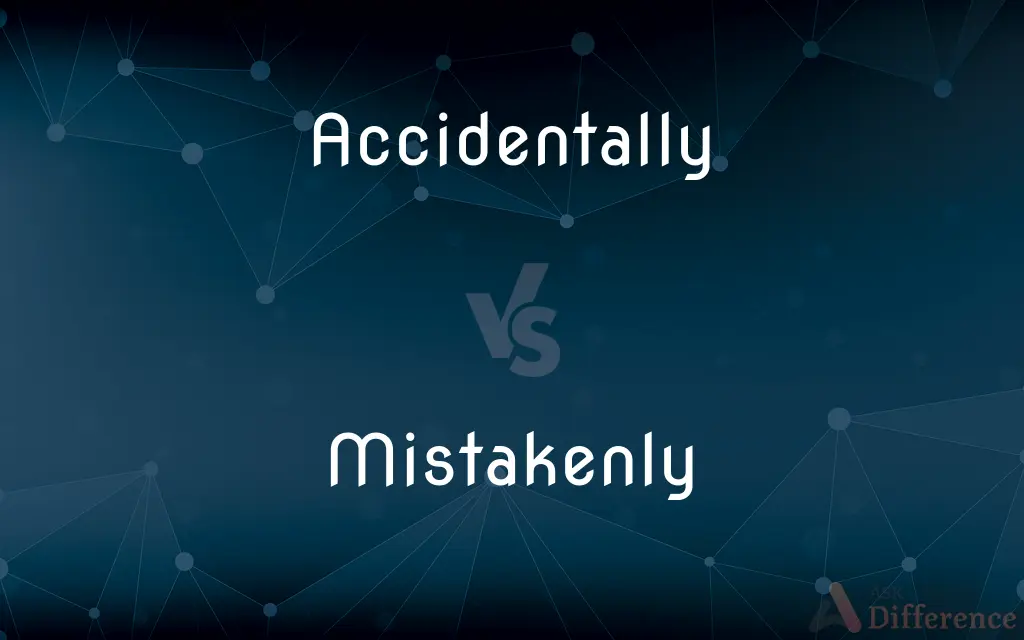Accidentally vs. Mistakenly — What's the Difference?
Edited by Tayyaba Rehman — By Fiza Rafique — Updated on April 24, 2024
"Accidentally" refers to an action done without intention, often resulting in unexpected outcomes, while "mistakenly" implies an action performed under a false assumption or incorrect belief, leading to an erroneous result.

Difference Between Accidentally and Mistakenly
Table of Contents
ADVERTISEMENT
Key Differences
"Accidentally" is used to describe an event or action that occurs without deliberate planning or intent, often leading to unintended consequences. In contrast, "mistakenly" denotes an action or decision based on incorrect information or misjudgment, highlighting the error in reasoning or understanding.
When someone does something accidentally, it implies a lack of control or foresight, such as spilling a drink or tripping over something. On the other hand, doing something mistakenly suggests a fault in perception or thought, like calling someone by the wrong name or misinterpreting a rule.
"Accidentally" often relates to physical actions and their immediate, unplanned effects, whereas "mistakenly" is more connected to cognitive processes and the incorrect conclusions or choices derived from them.
Legal and moral implications differ between the two: accidents may not carry blame if they are truly unavoidable, while mistakes can imply a degree of negligence or failure to verify facts.
In communication, "accidentally" might describe unintentional offenses or actions, like accidentally deleting a file. "Mistakenly," however, would be used where there's an error in judgment or belief, such as mistakenly believing a project deadline was extended.
ADVERTISEMENT
Comparison Chart
Definition
Done without intention or planning
Done under incorrect assumptions
Implication
Lack of control or foresight
Error in reasoning or information
Common Contexts
Physical actions and accidents
Decisions and cognitive errors
Legal/Moral Overtones
Less likely to imply blame
May suggest negligence
Examples
Spilling a drink, tripping
Using the wrong formula, misnaming
Compare with Definitions
Accidentally
Involving events that are not planned or intended.
Accidentally, she bumped into a celebrity at the cafe.
Mistakenly
Done by misunderstanding the correct information or context.
He mistakenly thought the meeting was cancelled.
Accidentally
Occurring without intention or through lack of attention.
He accidentally dropped the glass.
Mistakenly
Involving an incorrect belief or assumption.
She mistakenly accused him of taking her notes.
Accidentally
Happening by chance or unexpectedly.
They accidentally discovered a historic artifact while digging.
Mistakenly
Reflecting an error in judgment or decision.
They mistakenly invested in a dubious scheme.
Accidentally
Associated with unintended side effects or results.
The email was accidentally sent to the entire office.
Mistakenly
Used when a choice is influenced by faulty information.
Mistakenly, he booked the flight for the wrong day.
Accidentally
Often linked to mishaps or minor accidents.
She accidentally scratched the car while parking.
Mistakenly
Often leading to correction or rectification.
The announcement was mistakenly released early.
Accidentally
Occurring unexpectedly, unintentionally, or by chance.
Mistakenly
In a mistaken way; wrongly
They mistakenly believed her to be pregnant
Accidentally
(Music) Of or relating to an accidental.
Mistakenly
Past participle of mistake.
Accidentally
Being an animal, especially a bird, that has strayed beyond its normal range.
Mistakenly
Wrong or incorrect in opinion, understanding, or perception.
Accidentally
A property, factor, or attribute that is not essential.
Mistakenly
Based on error; wrong
A mistaken view of the situation.
Accidentally
Any of various signs that indicate the alteration of a note by one or two semitones or the cancellation of a previous sign.
Mistakenly
Wrongly, erroneously
I mistakenly assumed that the shop was still there.
Accidentally
A note that has been marked with such a sign.
Mistakenly
By accident, by mistake, in error without intention to do so
Today I mistakenly took your packed lunch to work.
Accidentally
An animal that has strayed beyond its normal range.
Mistakenly
By mistake.
Accidentally
In an accidental manner; by chance, unexpectedly.
He discovered penicillin largely accidentally.
Mistakenly
In a mistaken manner;
He mistakenly believed it
Accidentally
Unintentionally.
He accidentally exposed the bacteria to mold spores.
Accidentally
In an accidental manner; unexpectedly; by chance; unintentionally; casually; fortuitously; not essentially.
Accidentally
Without advance planning;
They met accidentally
Accidentally
In an incidental manner;
These magnificent achievements were only incidentally influenced by Oriental models
Accidentally
Without intention; in an unintentional manner;
She hit him unintentionally
Common Curiosities
How do the consequences differ between accidentally and mistakenly?
Consequences of accidental actions may be seen as more forgivable due to the lack of intent, whereas mistakes might reflect poorly on one's decision-making or attention to detail.
Is negligence associated more with accidentally or mistakenly?
Negligence is more commonly associated with mistakenly, as it implies a failure to take adequate steps to ensure correct understanding or action.
What is the main difference between accidentally and mistakenly?
"Accidentally" refers to actions done without intention, often leading to unforeseen outcomes, while "mistakenly" implies actions based on incorrect assumptions or beliefs.
Which term would you use if someone sent an email to the wrong person?
If it was done without realizing the error, "mistakenly" would be appropriate. If it happened through a mishap like a mis-click, "accidentally" fits better.
Can both terms be used interchangeably?
While sometimes used interchangeably in casual conversation, they denote different types of errors — accidental lacks intent, while mistaken implies incorrect beliefs.
What kind of scenarios typically involve mistakenly?
Scenarios involving mistakenly usually deal with misunderstandings or misinterpretations, such as following wrong directions or misapplying rules.
How can one avoid mistakes categorized under both terms?
Avoiding accidents involves careful attention and precautionary measures, whereas avoiding mistakes requires accurate information and clear communication.
Which term is more likely to involve legal implications?
"Mistakenly" can involve more significant legal implications, particularly if the mistake was due to neglecting to verify important information.
Are there any synonyms for accidentally and mistakenly?
Synonyms for "accidentally" include unintentionally, inadvertently; for "mistakenly," erroneously, incorrectly.
Can both accidentally and mistakenly imply blame?
Both can imply blame depending on context, but mistakenly often carries a stronger implication of fault due to the associated misjudgment.
Share Your Discovery

Previous Comparison
Abecedary vs. Abecedarian
Next Comparison
Sign vs. SighAuthor Spotlight
Written by
Fiza RafiqueFiza Rafique is a skilled content writer at AskDifference.com, where she meticulously refines and enhances written pieces. Drawing from her vast editorial expertise, Fiza ensures clarity, accuracy, and precision in every article. Passionate about language, she continually seeks to elevate the quality of content for readers worldwide.
Edited by
Tayyaba RehmanTayyaba Rehman is a distinguished writer, currently serving as a primary contributor to askdifference.com. As a researcher in semantics and etymology, Tayyaba's passion for the complexity of languages and their distinctions has found a perfect home on the platform. Tayyaba delves into the intricacies of language, distinguishing between commonly confused words and phrases, thereby providing clarity for readers worldwide.














































